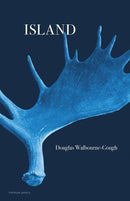Description
Douglas Walbourne-Gough is a poet and mixed/adopted status member of the Qalipu Mi’kmaq First Nation from Elmastukwek (the Bay of Islands), Ktaqmkuk (Newfoundland). His poetry has appeared in numerous publications, including Best Canadian Poetry in English, Grain, and the Fiddlehead, and has won the Riddle Fence Poetry Prize.
Walbourne-Gough’s debut collection, Crow Gulch, won the E.J. Pratt Poetry Award. It was also a finalist for NL Reads, the Derek Walcott Prize for Poetry, and the Raymond Souster Award, and was longlisted for the First Nations Community READS Award. Island is his second book of poetry.
“Canada rejected our applications for enrolment in the Qalipu First Nation. Initially, I was relieved by the rejection. I’d watched my hometown divide itself — are you Mi′kmaq or settler? Mi′kmaq or not Mi′kmaq enough?”
Centred around the Newfoundland Mi′kmaq experience in the wake of the controversial Qalipu First Nation enrolment process, Island wades through the fracture and mistrust that continues to linger in many communities. In this new collection, Douglas Walbourne-Gough expands upon issues of identity and history that he introduced in Crow Gulch, offering a deeply personal and equally beautiful exploration of Mi′kmaw and Newfoundland identity.
Walbourne-Gough’s narrative poems trace the formation of identity, not through status documentation, but through its deeper roots in childhood memories, family, spirituality, and dreams. Throughout this collection, he approaches life in fragments — snuggling into his nan’s sealskin snowsuit, learning Mi’kmaq from an app, or the myriad of complex emotions that come with receiving a status card — and watches them transform into pieces of an everlasting puzzle. Island reckons with an often-ignored, yet persistent, effect of colonialism — fractured identities.
Walbourne-Gough’s debut collection, Crow Gulch, won the E.J. Pratt Poetry Award. It was also a finalist for NL Reads, the Derek Walcott Prize for Poetry, and the Raymond Souster Award, and was longlisted for the First Nations Community READS Award. Island is his second book of poetry.
“Canada rejected our applications for enrolment in the Qalipu First Nation. Initially, I was relieved by the rejection. I’d watched my hometown divide itself — are you Mi′kmaq or settler? Mi′kmaq or not Mi′kmaq enough?”
Centred around the Newfoundland Mi′kmaq experience in the wake of the controversial Qalipu First Nation enrolment process, Island wades through the fracture and mistrust that continues to linger in many communities. In this new collection, Douglas Walbourne-Gough expands upon issues of identity and history that he introduced in Crow Gulch, offering a deeply personal and equally beautiful exploration of Mi′kmaw and Newfoundland identity.
Walbourne-Gough’s narrative poems trace the formation of identity, not through status documentation, but through its deeper roots in childhood memories, family, spirituality, and dreams. Throughout this collection, he approaches life in fragments — snuggling into his nan’s sealskin snowsuit, learning Mi’kmaq from an app, or the myriad of complex emotions that come with receiving a status card — and watches them transform into pieces of an everlasting puzzle. Island reckons with an often-ignored, yet persistent, effect of colonialism — fractured identities.


